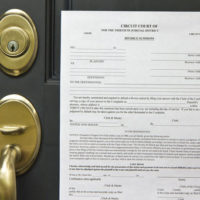Understanding the Process of Filing for Divorce in Texas

Deciding to get divorced is a major life decision with repercussions for both you and your family. The prospect of starting over may seem daunting and downright overwhelming when you start to contemplate the actual divorce process (e.g., filing paperwork with the court, dividing property, going before a judge, etc.). This is perfectly understandable. This is why it makes sense to retain the services of an experienced Houston divorce lawyer. They can help guide you through the divorce process. Below is a summation of the procedural steps involved in actually filing for divorce in Texas.
Before You File – Do You Meet the Residency Requirements?
Some people mistakenly believe that they must get divorced in the state in which they married. This is not true, but there are specific residency requirements that must be met to file for divorce. In Texas, either you or your spouse must have resided in the Lone Star state for six months prior to filing for divorce. Furthermore, either you or your spouse need to have actually resided in the county where you file for 90 days or more.
Forms that Must Be Filed
In Texas, there is a uniform list of forms that need to be filed with a court in order to get the process started for securing a divorce. For example, your initial filing needs to include the following: (i) petition for divorce, (ii) citation, (iii) notice of service of process, and (iv) a proposed decree of divorce. If you retain the services of an experienced Houston divorce lawyer, they can handle the filing of these forms.
Keep in mind, some courts do their own thing and have specialized local forms. Therefore, a good rule of thumb is for you or your divorce lawyer to contact the county clerk where you’re looking to get divorced to determine which forms are acceptable.
Disclosing Your Finances
In addition to the forms described above, you and your spouse are required to exchange financial information in a “Sworn Inventory and Appraisement” form. This document contains a list of all of your financial assets and liabilities including:
- Bank accounts
- Retirement accounts
- Investment accounts
- Real estate (e.g. mortgage on a house)
- Loans and other liabilities
Filing and Serving Divorce Papers
Once all of the necessary forms are filled out, they need to be filed with the appropriate county clerk. There is typically a filing fee as well. Once you file divorce papers with the clerk, you must then notify your spouse that you filed for divorce. This is known as “service of process.” Basically, it is fancy term for delivering copies of all divorce paperwork to your soon-to-be-ex-spouse. Service of process is often completed through the county sheriff, process server, or publication (this form of service can get expensive since you have to publish the notice in a local newspaper). You and your spouse can also agree to a waiver of service of process. You spouse simply has to sign a form acknowledging that they received copies of the initial filing.
Contact an Experienced Houston Divorce Lawyer Today
As you can see, there are multiple steps required to simply file the necessary divorce paperwork. This is why you should hire an experienced divorce lawyer to help you through this complex process. The Houston family lawyers at Lindamood & Robinson, P.C. have decades of experience handling all types of divorce cases and we are ready to help you.
Resources:
statutes.legis.state.tx.us/Docs/FA/htm/FA.6.htm
texasbar.com/AM/Template.cfm?Section=Texas_Bar_Journal&Template=/CM/ContentDisplay.cfm&ContentID=23883


